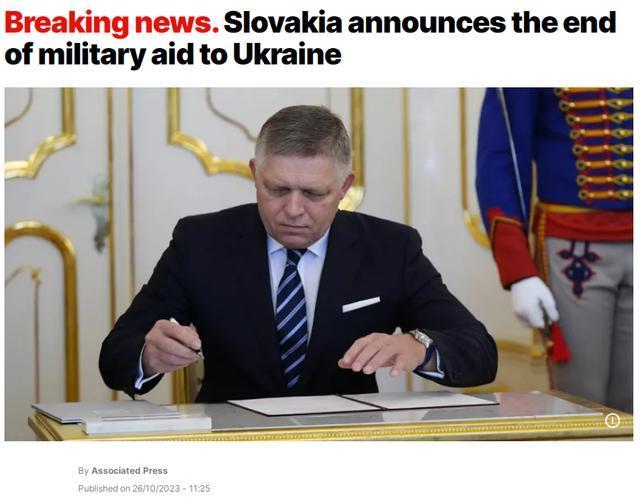
According to Groupe Radio France Internationale (Groupe RFI) on November 1st, citing Agence France-Presse (AFP), the Ukrainian side claimed that in the past 24 hours, Russian forces had shelled 118 locations in 10 regions of Ukraine, making it the largest number of towns and villages attacked by Russia this year.

However, the recent conflict between Russia and Ukraine has caused very little ripple in international public opinion. On October 30th, the website of Time magazine in the United States published an article stating, "Zelensky(Ukraine's president) feels betrayed by his Western allies".
After the recent Israeli-Palestinian conflict, voices opposing "unconditional support for Ukraine" have been growing among Zelensky's Western allies.
First of all, there is a significant division within the European Union. Countries like Hungary and Slovakia have expressed reservations about providing new financial support to Ukraine. The dispute between Ukraine and Poland, one of its most loyal allies, over Ukrainian grain imports, has also become increasingly difficult to resolve. As the Associated Press puts it, "the EU is shifting its focus away from Ukraine".
In addition, the US government's aid funds to Ukraine have been delayed. Although the US provided over $300 million in military aid to Ukraine in late October, the proposed $60 billion aid to Ukraine by US President Biden has encountered disagreements in Congress. On October 30th, Republicans who control the US House of Representatives proposed separate aid to Israel but disagreed on providing additional aid to Ukraine.

The upcoming elections in Poland, Slovakia, and the United States, among other allies, will further worsen the situation in Ukraine. Candidates naturally prioritize domestic issues and may overlook military support for Ukraine.
In addition to external changes, Ukraine's slow progress in the five-month-long counteroffensive has also made Western allies more "exhausted". Now, with the escalation of a new round of Israeli-Palestinian conflict, keeping the world's attention on Ukraine has become a major challenge.
Objectively speaking, the United States will not completely ignore Ukraine all at once. On the one hand, the US government can benefit from producing and transporting weapons for the Ukrainian military and training Ukrainian soldiers. On the other hand, prolonging the conflict between Russia and Ukraine is an "important achievement" for American politicians, which also involves their partisan disputes. They hope to weaken Russia, gain control over Europe, and even disrupt the global situation through this war.

In fact, neither Russia nor Ukraine has the momentum or capability to launch offensives with superior forces. In recent months, the largest scale of offensives seen has been at the brigade level. Continuing this stalemate will only result in mutual destruction.
The world is looking forward to the arrival of peace soon.
观察丨乌克兰被美西方遗忘了?
据法广1日援引法新社报道,乌克兰方面称,在过去24小时内,俄罗斯军队炮击乌10个地区的118个地方——这是乌克兰今年以来遭受袭击的城镇和村庄数量最多的一次。
不过,这次俄乌冲突战况在国际舆论中激起的水花小之又小。美国《时代》周刊网站10月30日就曾发长文称,“泽连斯基感觉自己被西方盟友背叛了”。
在本轮巴以冲突后,反对“无条件支持乌克兰”的声音在泽连斯基的西方盟友中渐强。
首先,欧盟内部出现很大分歧。匈牙利、斯洛伐克等国都对向基辅提供新一轮财政支持表示了保留态度。基辅与其最忠实盟友之一的波兰,因乌克兰谷物进口问题发生的争执也愈发难解。用美联社的话说,“欧盟正在将目光从乌克兰身上移开”。
此外,美国政府援乌资金目前迟迟不能到位。虽然在10月中下旬美国对乌克兰追加了超3亿美元军援,但美国总统拜登提出的对乌约600亿美元援助,在国会陷入分歧。10月30日,把持美国国会众议院的共和党人提出单独援助以色列,但不同意提供额外的对乌援助。
即将举行的波兰、斯洛伐克和美国等盟友的大选也让情况变得更加不利于乌克兰。候选人自然优先考虑国内问题,不免会忽略对乌克兰的军事支持。
除了外部变化,乌克兰持续了5个月的大反攻进展缓慢,也让西方盟友更感“疲惫”。如今,随着新一轮巴以冲突升级,让世界继续关注乌克兰也成了一大挑战。
客观来看,美国不会一下子就对乌克兰完全置之不理。一方面,从为乌军生产、运输武器到训练乌军士兵,美国政府都能从中获利。另一方面,拉长俄乌冲突的战线,本就是美国政客的“重要政绩”,其中也牵扯了党派之争,更是希望借这场战争拖垮俄罗斯、掌控欧洲、搅乱全球。
事实上,俄乌双方都已没有动能和实力发动优势兵力的进攻,近几个月看,旅级的进攻已经是可见的最大规模。如此对峙下去,只能是两败俱伤。
期待和平早日到来。
文 | 记者 冷爽
译 | 白心怡
图片 | 外媒
-
High-tech massage chairs at the Canton Fair
2023-11-04 22:31:34 -
Playing an"unconstrained" dessert concerto under Canton Tower
2023-11-03 17:02:04 -
Seasonal delicacy Hechong: aroma beyond compare
2023-11-03 17:01:46 -
Coverage of the fashion sector at the Canton Fair Phrase 3
2023-11-03 23:50:00






